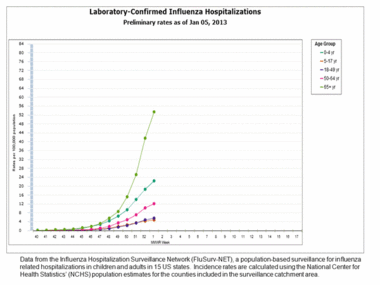Flu outbreak 2013: apparently your mom knew what she was talking about.

by Robin Dorner
Editor in Chief
"Wash your hands, cover your mouth when you cough or sneeze and keep your hands away from your eyes, mouth and nose."
The same things your mother told you as a child are still critical today as the nation experiences what is expected to be its worst flu season in a decade.
According to the Centers for Disease Control and Prevention (CDC), all but seven states and the District of Columbia were experiencing a "widespread" outbreak of the flu.
How bad is it? Consider this in the Gayly region:
— Kansas is one of 41 states that have been designated by the Atlanta-based Centers for Disease Control and Prevention as having a “widespread” flu outbreak.
— In Wichita, KS., a spokesperson for St. Francis said they have treated as many as 18-20 patients per day for flu-like symptoms, but so far have had one positive flu screening in November, nine in December and seven so far in January.
— New influenza statistics released this week by the Oklahoma State Department of Health indicate 345 persons have been hospitalized and eight persons have died in Oklahoma since reporting for the current flu season began on Sept. 30, 2012.
— Influenza-associated hospitalizations in Oklahoma have been reported statewide while influenza-related deaths have occurred among three residents of Tulsa County, and one each from Creek, Mayes, Muskogee, Pittsburg, and Rogers counties.
— The CDC said Friday that Arkansas is among a few states in this region in which flu cases spread less rapidly in the past week, but a state Health Department spokesman said it's too early to say cases have peaked there. Nine people have died from the flu so far in Arkansas, including one child.
On the east coast:
— Boston Mayor Thomas Menino declared a public health emergency Wednesday in response to 700 confirmed cases of the flu - 10 times more than all of last year - along with four flu-related deaths. In the state of Mass., 18 influenza related deaths have been attributed to the flu.
— Lehigh Valley Hospital-Cedar Crest in Allentown, Pa., has erected a heated tent outside the hospital to treat those patients with mild symptoms and keep them isolated from the more serious cases inside. The hospital has been treating 80-100 people suffering from flu-like symptoms a day. So far, 22 flu-related deaths have been recorded statewide.
— Chicago has been treating so many patients with the flu that one hospital has been placed on "bypass." That means ambulances transporting patients in stable condition are being directed to nearby hospitals because of the high volume of flu patients.
— In New Hampshire, 13 deaths were attributed to the flu in December, considerably more than in recent years. While none of the deaths has involved children, Dr. Jose Montero, the state's public health director, warned the virus can spread easily among schools and day care centers.
We’re not out of the woods on this outbreak; the flu season just got under way two months ago and can run as late as April or early May.
That's precisely what has health experts on edge — that and the fact that the traditional flu season is being supplemented by the arrival of a new kind of intestinal bug and the worst outbreak of whooping cough in more than 50 years.
For weekly updates of the influenza stats across the nation, visit http://www.cdc.gov/flu/weekly/summary.htm.
What can Gayly readers do to protect themselves during this nasty flu season?
- First and foremost, get vaccinated if you haven't already done so, according to the CDC. Contact your doctor, your local public health department or an area pharmacy that offers that service.
- You should also avoid close contact with people who are sick — and vice versa. If you are coming down with flu-like symptoms, stay away from work, school or other public places.
- As we mentioned earlier, cover your mouth with your sleeve when you cough or sneeze, so that you can prevent the spread of germs to others. And avoid touching your eyes, mouth and nose in case you touch something that has been contaminated.
- Finally, wash your hands frequently — long enough to sing "Happy Birthday" twice is a common rule — with soap and water or an alcohol-based sanitizer.
Apparently, your mom knew what she was talking about.
Editors note: The New England Editorial Roundup & The Associated Press contributed to this story.
Additional influenza statistics for 2012-2013: Between October 1, 2012 and January 5, 2013, 3,710 laboratory-confirmed influenza-associated hospitalizations were reported. This is a rate of 13.3 per 100,000 population. The most affected group is people ≥65 years. Among all hospitalizations, 3,198 (86.2%) were associated with influenza A and 484 (13.0%) with influenza B. There was no virus type information for 22 (0.6%) hospitalizations. Among hospitalizations with influenza A subtype information, 767 (98.7%) were attributed to H3 and 10 (1.3%) were attributed to 2009 H1N1. The most commonly reported underlying medical conditions among hospitalized adults were metabolic disorders, cardiovascular disease, obesity, and chronic lung disease (excluding asthma). Among 55 hospitalized women of childbearing age (15-44 years), 10 were pregnant. The most commonly reported underlying medical conditions in hospitalized children were asthma, neurologic disorders, and immune suppression. More than 40% of hospitalized children had no identified underlying medical conditions. Additional FluSurv-NET data can be found at: http://gis.cdc.gov/GRASP/Fluview/FluHospRates.html and http://gis.cdc.gov/grasp/fluview/FluHospChars.html.





